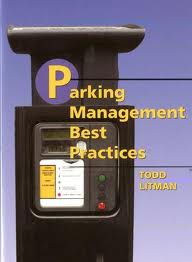Parking Management Best Practices
- Publisher
- American Planning Association (June 30, 2006)
- Price
- Kindle: $75.50 Print: From $41.18
- Authors
- Todd A. Litman
Summary
Hardcover: 292 pages Language: English
The typical automobile is parked 23 hours a day. Where and how can make a big difference to economic development, traffic reduction, smart growth, historic preservation, and many other planning efforts. The parking management strategies described in this book will help planners increase parking facility efficiency and reduce parking demand. Parking management offers an alternative to traditional predict and provide parking planning, which has contributed to widespread auto dependency and urban sprawl. Instead of providing plentiful free parking, parking management provides optimal parking supply and pricing. Its benefits include support for transit-oriented development; reduced stormwater management costs, water pollution, and heat island effects; improved travel options for nondrivers; lower housing costs; and more livable communities. For planners who need to establish more accurate and flexible parking standards, this book is a blueprint for developing an integrated parking plan. It explains how to determine parking supply and affect parking demand, as well as how to calculate parking facility costs. It also offers information about shared parking, parking maximums, financial incentives, tax reform, pricing methods, and other management techniques. What types of locations benefit from parking management? Places with perceived parking problems. Areas with rapidly expanding population, business activity, or traffic. Commercial districts and other places with compact land-use patterns. Urban areas in need of redevelopment and infill. Places with high levels of walking or public transit or places that want to encourage those modes. Districts where parking problems hinder economic development. Areas with high land values Neighborhoods concerned with equity, including fairness to nondrivers. Places with environmental concerns.


